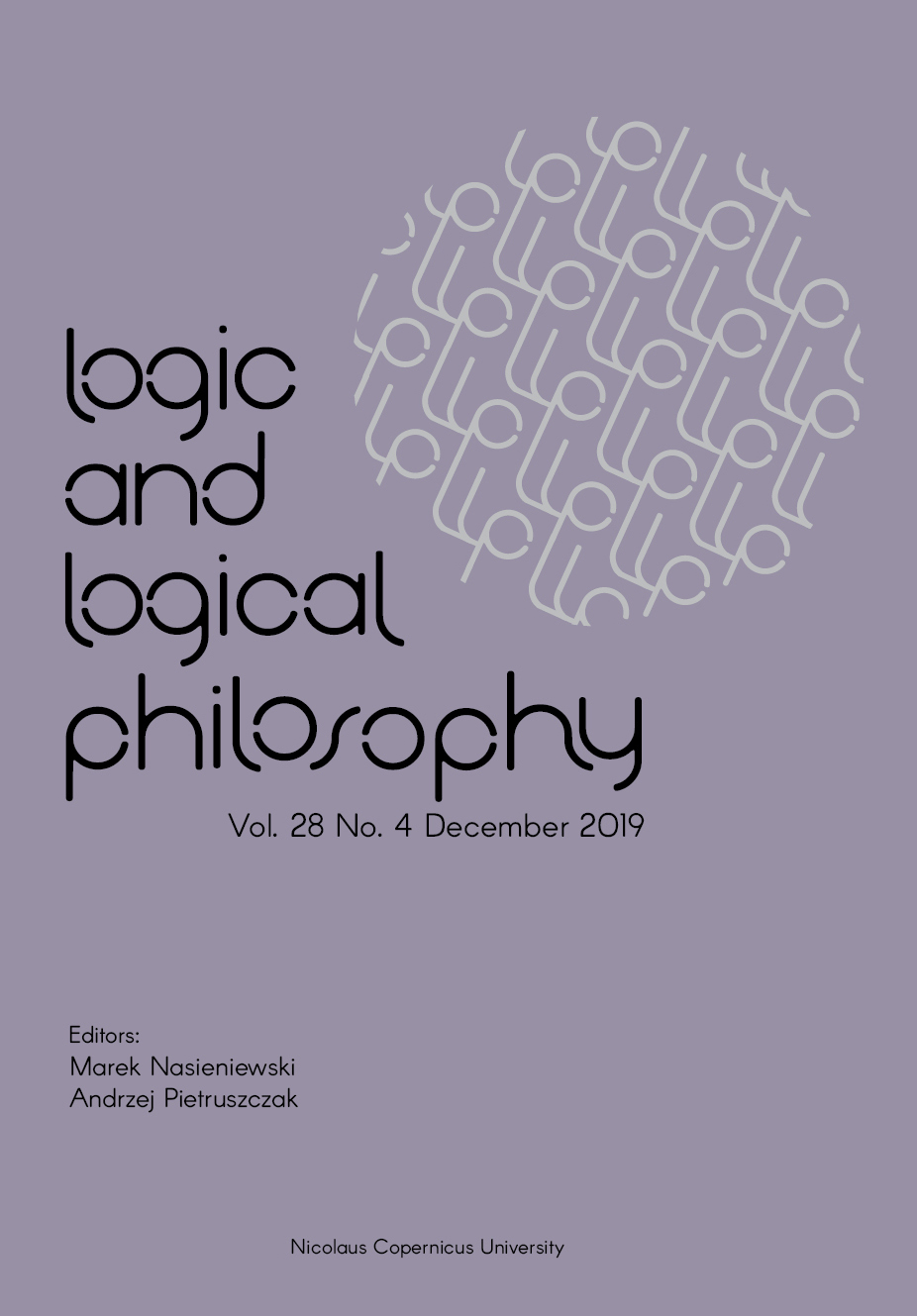Syntactic Proofs for Yablo’s Paradoxes in Temporal Logic
DOI:
https://doi.org/10.12775/LLP.2019.020Keywords
non-self-referential paradox, Yablo’s paradox, linear temporal logic, syntactic proofsAbstract
Temporal logic is of importance in theoretical computer science for its application in formal verification, to state requirements of hardware or software systems. Linear temporal logic is an appropriate logical environment to formalize Yablo’s paradox which is seemingly non-self-referential and basically has a sequential structure. We give a brief review of Yablo’s paradox and its various versions. Formalization of these paradoxes yields some theorems in Linear Temporal Logic (LTL) for which we give syntactic proofs using an appropriate axiomatization of LTL.
References
Barrio, E.A., 2010, “Theories of truth without standard models and Yablo’s sequences”, Studia Logica 96 (3): 375–391. DOI: http://dx.doi.org/10.1007/s11225-010-9289-8
Barrio, E.A., and B. Da Ré, 2018, “Truth without standard models: Some conceptual problems reloaded”, Journal of Applied Non-Classical Logics 28 (1): 122–139. DOI: http://dx.doi.org/10.1080/11663081.2017.1397326
Barrio, E.A., and L. Picollo, 2013, “Notes on w -inconsistent theories of truth in second-order languages”, The Review of Symbolic Logic 6 (4): 733–741. DOI: http://dx.doi.org/10.1017/S1755020313000269
Beall, J.C., 2001, “Is Yablo’s paradox non-circular?”, Analysis 61 (3): 176–187. DOI: http://dx.doi.org/10.1093/analys/61.3.176
Brandenburger, A., and H.J. Keisler, 2006, “An impossibility theorem on beliefs in games”, Studia Logica 84 (2): 211–240. DOI: http://dx.doi.org/10.1007/s11225-006-9011-z
Bringsjord, S., and B. van Heuveln, 2003, “The ‘mental eye’ defence of an infinitized version of Yablo’s paradox”, Analysis 63 (1): 61–70. DOI: http://dx.doi.org/10.1093/analys/63.1.61
Bueno, O., and M. Colyvan, 2003a, “Yablo’s paradox and referring to infinite objects”, Australasian Journal of Philosophy 81 (3): 402–412. DOI: http://dx.doi.org/10.1080/713659707
Bueno, O., and M. Colyvan, 2003b, “Paradox without satisfaction”, Analysis 63 (2), 152–156. DOI: http://dx.doi.org/10.1093/analys/63.2.152
Cieśliński, C., 2013, “Yablo sequences in truth theories”, pages 127–138 in K. Lodaya (ed.), Indian Conference on Logic and Its Applications, Springer, Berlin, Heidelberg. DOI: http://dx.doi.org/10.1007/978-3-642-36039-8_12
Cieśliński, C., and R. Urbaniak, 2013, “Gödelizing the Yablo sequence”, Journal of Philosophical Logic 42: 679–695. DOI: http://dx.doi.org/10.1007/s10992-012-9244-4
Forster, T., and R. Goré, 2016, “Yablo’s paradox as a theorem of modal logic”, Logique et Analyse 59 (253): 283–300.
Karimi, A., 2017, “A non-self-referential paradox in epistemic game theory”, Reports on Mathematical Logic 52: 45–56. DOI: http://dx.doi.org/10.4467/20842589RM.17.002.7140
Karimi, A., and S. Salehi, 2014, “Theoremizing Yablo’s paradox”, Preprint arXiv:1406.0134.
Karimi, A., and S. Salehi, 2017, “Diagonal arguments and fixed points”, Bulletin of the Iranian Mathematical Society 43 (5): 1073–1088.
Ketland, J., 2004, “Bueno and Colyvan on Yablo’s paradox”, Analysis 64 (2): 165–172. DOI: http://dx.doi.org/10.1093/analys/64.2.165
Ketland, J., 2005, “Yablo’s Paradox and w -Inconsistency”, Synthese 145 (3): 295–302. DOI: http://dx.doi.org/10.1007/s11229-005-6201-6
Kröger, F., and S. Merz, 2008, “Temporal logic and state systems”, Springer.
Leach-Krouse, G., 2014, “Yablifying the Rosser sentence”, Journal of Philosophical Logic 43 (5): 827–834. DOI: http://dx.doi.org/10.1007/s10992-013-9291-5
Luna, L., 2009, “Yablo’s paradox and beginningless time”, Disputatio 3 (26): 1–8. DOI: http://dx.doi.org/10.2478/disp-2009-0002
Picollo, L.M., 2013, “Yablo’s paradox in second-order languages: Consistency and unsatisfiability”, Studia Logica 101 (3): 601–617. DOI: http://dx.doi.org/10.1007/s11225-012-9399-6
Pnueli, A., 1977, “The temporal logic of programs”, pages 46–57 in 18th Annual Symposium on Foundations of Computer Science (SFCS’77) IEEE Computer Society. DOI: http://dx.doi.org/10.1109/SFCS.1977.32
Priest, G., 1997, “Yablo’s paradox”, Analysis 57 (4): 236–242. DOI: http://dx.doi.org/10.1093/analys/57.4.236
Sorensen, R.A. 1998, “Yablo’s paradox and kindred infinite liars”, Mind 107 (425): 137–155. DOI: http://dx.doi.org/10.1093/mind/107.425.137
Yablo, S., 1985, “Truth and reflection”, Journal of Philosophical Logic 14: 297–349. DOI: http://dx.doi.org/10.1007/BF00249368
Yablo, S., 1993, “Paradox without self-reference’, Analysis 53: 251–252. DOI: http://dx.doi.org/10.1093/analys/53.4.251
Yablo, S., 2004, “Circularity and paradox”, pages 139–157 in T. Bolander, V.F. Hendricks and S.A. Pedersen (eds.), Self-Reference CSLI Publications. http://www.mit.edu/~yablo/circularity¶dox.pdf
Yatabe, S., 2011, “Yablo-like paradoxes and co-induction”, pages 90–103, chapter 8, in Y. Onada, D. Bekki and E. McCready (eds.), New Frontiers in Artificial Intelligence, JSAI-isAI 2010, vol. 6797 of Lecture Notes in Computer Science, Springer. DOI: http://dx.doi.org/10.1007/978-3-642-25655-4_8
Downloads
Published
How to Cite
Issue
Section
Stats
Number of views and downloads: 576
Number of citations: 1







